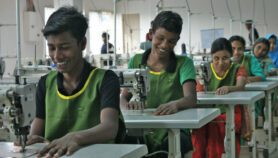By: Bhavani R. V.
Send to a friend
The details you provide on this page will not be used to send unsolicited email, and will not be sold to a 3rd party. See privacy policy.
S&T advances should safeguard health, equity and the rights of vulnerable populations, says rural development professional Bhavani R. V.
Science and technology (S&T) is crucial to economic and social progress. But unless the technology 'push' is matched by an ethical 'pull', bringing the benefits of such progress to all sections of the population across nations, sex and class, the products of our brains will be a curse rather than a blessing, to paraphrase Einstein. [1]
There are countless examples — from discoveries such as penicillin helping to save millions of lives on one hand, to the potential use of biological agents in warfare destroying lives on the other.
Likewise, while information and communication technologies (ICTs) have ushered an information revolution, they are capable of infringing on the lives of people in negative ways, from access to private information to cyber crimes.
It is in these situations that we need a human rights-based approach to scientific responsibility.
Responsible science
Today, the major challenges facing developing countries in Africa, Asia and Latin America are ensuring access to affordable healthcare and food, and ensuring balanced and sustainable use of natural resources.
Many countries have large populations that depend on agriculture. The challenge now is to produce more from diminishing per capita arable land and water resources in the face of stresses such as extreme weather and pests.
Biotechnology provides an opportunity to convert biological resources into economic wealth, with developments in genetic modification promising high yields and crops with resistance to drought or pests. But this must be done in a manner that protects the environment, and human and animal health.
Efforts to harness biotechnology should also take into account the rights of indigenous peoples and low-resource farmers, as well as biodiversity conservation. The technology can enable big seed companies to undermine the right of small farmers to save, breed and exchange seeds, pushing them towards a vicious cycle of high costs and dependency.
Last year's protests against commercialisation of Bt brinjal in India highlighted these issues. The same concern has now led a parliamentary standing committee call for a moratorium on field trials of genetically modified crops until a strong and effective regulatory mechanism is in place.
Science drives 'divides'
The fast pace of technological advancement has increased the gulf between those who can enjoy its benefits and those unable to access them.
The potential of mobile telephony to address the problems of poverty — from supplying small farmers with information on crop prices to providing telemedicine facilities in remote locations — is immense. But a digital divide exists, with the benefits of ICT yet to reach many parts of the world.
A gender divide is visible in the low number of women working in science, and the differential access to the fruits of S&T. In countries such as India, this is reflected in the adverse sex ratio (favourable to boys, adverse to girls), illegal sex determination tests and female foeticide.
And the ongoing trend of globalisation has aggravated socioeconomic divides, with development tending to be led by global market forces rather than publicly funded research and national priorities.
Protecting health
This market-led application of science can be seen in neglected tropical diseases getting less research funding than those affecting developed countries.
Intellectual property rights, patents and pricing determine access to affordable healthcare. This poses the challenge of redirecting global resources into R&D initiatives that address the health priorities of developing countries, and of making drugs and vaccines more accessible to their people.
Similar issues apply to clinical trials. While the ethical conduct of research should be a basic requirement, it can be overlooked by drug companies and others with powerful interests.
In a recent case, investigations following the deaths of young girls enrolled in a clinical trial of the human papillomavirus (HPV) vaccine in India highlighted serious ethical violations. For example, the subjects were not aware of the implications of the vaccine and there was no follow-up support.
In the face of weak regulatory systems, the low value placed on life in poor countries often results in a lack of adherence to procedural requirements. It also feeds an illegal organ trade that caters to the demand for transplants.
But it is here that the ethical responsibility of the scientific community to safeguard human rights is even higher.
Citizens over corporations
The Universal Declaration of Human Rights, adopted by the UN in 1948, has been followed by several declarations and commitments that call for use of S&T for the benefit of humankind.
A human rights approach to scientific responsibility is embedded in these commitments. Adhering to them means strengthening public research and prioritisation, and upholding the rights of citizens over the interests of corporations and power lobbies in developed countries. It entails responsibility by nations, organisations and individuals.
Unless there is serious commitment in S&T to make human rights and ethics paramount, the inequities will only continue to grow and development targets will remain an illusory goal.
Bhavani R. V. is a director at the M. S. Swaminathan Research Foundation, India, coordinating a project on Leveraging Agriculture for Nutrition in South Asia (LANSA). Bhavani can be contacted at [email protected].
This article is part of a Spotlight on Linking human rights, science and development.
References
[1] Albert Einstein (Wikipedia, accessed 2012)













